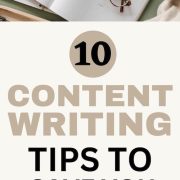10 Content Writing Tips To Help You Produce Quality Articles

Content writing tips that will save you time: Have you ever struggled to write content for your business? Ever sat staring at a blank screen for hours?
Writer’s block affects us all. Every blogger has had those days. Or even months!
As an affiliate partner of various brands and sponsored content, HerPaperRoute may earn commission on qualifying purchases. Disclaimer
But I want to let you in a little secret that solves the issue: there are quality writers and ai tools out there, to write your content for you!
Read on for my content writing tips to help you overcome writer’s block!
10 Content Writing Tips

A lot of entrepreneurs I meet tell me they hate blogging (GASP!). They think it takes too much time and they simply don’t see any point in it.
The typical responses:
“I’m not a crafter/fashionista/cook/insert typical lifestyle blog category here.”
“No one would read it.”
“I have nothing to write about.”
These excuses only show me one thing – that these people are missing the point.
The point of blogging for business owners is simple. It’s to help you make more sales.
Your blog doesn’t need to get thousands of views every day. Your blog simply needs to demonstrate that you know your stuff.
- By writing a blog that delivers consistent value and demonstrates your expertise to your target audience.
- By showing readers that you understand their biggest pain points.
- By providing answers to the questions they have about your niche or products.
But you do need to publish fresh articles often, and sometimes it’s that consistency that is the hardest part.
Related: What is a niche site?
9 Content Writing Tips To Help You Produce Epic Content
Have you ever felt drawn to something without knowing why?
A pull towards something — an object, an activity, a person – that you couldn’t explain?
And then when you followed that hunch, you discovered something brilliant?
That’s exactly how I stumbled across Roy Peter Clark’s book, Writing Tools: 50 Essential Strategies for Every Writer. On a rainy October afternoon, I walked by one of my favorite bookstores and felt this little nudge to go inside.
I followed the hunch, went in, and felt drawn to a specific aisle.
Within minutes I was holding the Writing Tools book in my hands and flipping through it. Then I was walking to the checkout counter to purchase it.
This book has flipped my writing style completely on its head. I’ve always felt called to be a writer, way back to the days of submitting my short stories to contests at my local library when I was 10.
But until reading this book I’d never really invested much into learning more about writing or improving my writing skills.
This book, along with Elizabeth Gilbert’s book Big Magic, has given me so much confidence in my writing, along with the kick in the butt I needed to start a daily writing practice.
I’ve been writing my little buns off lately and I honestly feel like I’m getting better at it every day.
How do you feel about your writing skills?
Do you worry your message is getting lost in the shuffle? Do you struggle to get your point across when you write? Are you having trouble finding your “voice”?
If so…
- #1. Use ChatGPT to give you outlines and ideas, then hire a writer to fill in the gaps
- #2. Run, don’t walk, to buy Writing Tools and Big Magic.
- #3. Read on, because I’ve compiled 9 more hot content writing tips to help you write with purpose, passion, and the poise of a professional.
#1. There are no “rules”, only “tools”
Any advice you’re ever given when it comes to writing should be viewed as ideas and suggestions, not hard-and-fast rules. They’re tools, and you can choose to use ’em or lose ’em.
It’s up to you. It’s your writing.
This is Roy Peter Clark’s first lesson in the book and I freaking love it.
Sometimes it’s totally okay to chuck the grammar and punctuation rules out the window. Your goal is to communicate your message in a way that makes sense to your readers. That’s it. You’re not writing an essay for your high school English class.
If you want to use a bunch of exclamation marks, do it!!
If you want to use #hashtags, go for it.
There’s no one stopping you. In fact, adding those little bits of flavor and “you-ness” will only make your blog stand out from the sea of others.
Some ai writing tools I like:
You can also hire writers via an agency.
Tip #2. Read, consume, learn
If you want to improve your writing, READ.
Read often. Read everything you can. It doesn’t even have to be something within your niche.
Expand your horizons a bit.
If you write a health blog, try reading a pop culture magazine. If you write a beauty blog, check out an astrology book.
If you feel a tug in your gut toward a certain topic or book, follow that tug.
You’ll learn something new that you wouldn’t have known otherwise, and 9 times out of 10 it will be exactly what you needed at that point in time.
Tip #3. Write, write, write. every single day.
Becoming a writer is simple: Start writing.
This point was made in both Clarke and Gilbert’s books, and although it’s beautifully simple, it’s also slightly terrifying.
What if no one likes my writing? What if I try and fail? What if it’s bloody terrible?
I know those thoughts intimately. Trust me, I do. But that’s all they are — just thoughts.
These thoughts are simply your ego talking. You need to push past these thoughts and just. start. writing.
Write whenever, wherever, and however you can. Write blog posts. Write journal entries. Write short stories, poems, grocery lists, chapters for a novel, emails.
In Big Magic, Gilbert shares her mindset toward daily writing and I instantly fell in love with it.
She says to approach your writing knowing you’re not going to publish everything you write. In fact, you don’t have to share a single word with another soul if you don’t want to. You’re simply practicing.
And when a piece of writing shapes up beautifully, you might share it. Or you might not. It’s your choice.
Start writing for the sake of writing, and forget the outcome.
Tip #4. Embrace your voice and quirks
In my mind, the best part about blogging is the connection it creates.
Within minutes of publishing a new blog post, you can be chatting with your readers about it, getting their feedback, and answering questions.
But some blog posts invite more two-way conversation than others, right?
Writing warmly, sincerely, and genuinely will take you so, so far as a blogger.
Again, it’s not always about rules. Now, I’m not saying you should write poorly, that’s not what I mean. Instead, I just want you to embrace your voice and inject your personality into your writing a bit more!
Write like you talk. Ask questions to keep your readers engaged and to encourage that two-way conversation.
If you’re struggling to get your “voice” on paper, try recording yourself talking about a certain topic for 5 minutes, and then listen back to the recording and pull out the gems.
Write them down exactly as you said them, then flesh things out, add a bit more detail if needed, and format the post in a way that makes sense.
Voila — there’s your new blog post!
Tip #5. Write about what you love
Your readers can tell if a blog post is forced, and the best blog posts are ones that come from a place of passion. Feeling like you have to write about a certain topic is the fastest way to kill your creativity.
I like to keep a running list of blog post ideas in a Google doc, and when it’s time to write a new post, I look through my list and choose the topic I’m most excited to write about.
This guarantees that I’m always motivated to write, edit, and publish the post.
Also remember that you don’t have to follow blogging and business trends. You only have to write about what feels good and exciting to you.
Tip #6. Write first, edit second
Or, as Hemingway ever so eloquently put it: “Write drunk, edit sober.”
When writing, you have only one goal: To get your thoughts down on paper, in whatever shape, form, and order they come in.
Give yourself permission to write uninterrupted for as long as it takes to get your ideas out of your brain and onto the paper. Only once you’ve said everything you need to say should you pull out your red pen and start revising.
I actually prefer to write and edit my blog posts on separate days altogether.
This helps me stay focused on the task at hand for as long as possible without forcing my brain to switch back and forth between different modes of thinking.
Tip #7. Trim the fat
This tip from Roy Peter Clark has been the most impactful on my writing. I have the tendency to throw extra words into my writing like confetti, but this only leads to a ton of useful fluff.
Roy Peter Clark says that every paragraph should serve the larger purpose of getting your message across. Every sentence should add something valuable. Every. single. word. counts. So don’t use ten words when two will do.
Now, I don’t want you to worry about those extra words when you’re writing and in the zone. But when it’s time to edit, trim that fat girl!
Here are a few cuts to make, as per Roy Peter Clark:
1) Cut out any passage that does not support your focus.
2) Cut out the weakest quotations, anecdotes, and scenes.
– WRITING TOOLS, pg. 51
And specifically, here’s what he says to target when cutting:
1) Adverbs that intensify rather than modify: just, certainly, entirely, extremely, exactly
2) Prepositional statements that repeat the obvious: in the story, in the article
3) Abstract nouns that hide active verbs: consideration becomes considers; judgment becomes judges; observation becomes observes
3) Restatements: a sultry, humid afternoon
– WRITING TOOLS, pg. 52
Each of the above has its own chapter in Clark’s book, so be sure to pick up a copy if you want the full scoop.
Tip #8. Focus on serving your readers
Just like every sentence should support the main message of your post, every post should support the overall purpose of your business.
If you haven’t already, take a few minutes to get clear on:
- Who you’re writing for
- Why you’re writing for them
- What your big purpose is with your business and content
Once you’re crystal clear on those things, you should only share content that supports your goals and larger purpose in business.
If you write something amazing but it doesn’t fit in with your mission, submit it as a guest post to another site where it does fit. Or leave it unpublished. It’s up to you.

Tip #9. Use The 5 Question Method
I use the 5Q Method every single time I’m about to start writing a new blog post. I ask myself the same 5 questions, write out my answers to them, and boom — there’s the outline for my blog post. From there, writing the actual post is a breeze.
Not only will the 5Q Method speed up your writing, it also ensures that your content…
1) Answers your readers’ questions
2) Engages your readers from the get-go
3) Makes sense and flows nicely
4) Drives home your main points
5) Provides extra value and wows your audience
Want to try out the 5Q Method for your next blog post? You’ll be hooked from day one, promise. Here’s the post with all the details.
Keeping up your blog can be a major time suck. With managing your business, finding clients, and actually doing the work, there’s hardly enough time for maintaining a blog (or a social life amiright?!)
Blogging can be hugely important to your business, especially in attracting new clients and building up your community. It’s one of those things that you have to make time for to see a return from. Here are 3 ways to get more done with less time for your blog.
Write In Your Zone
You know how sometimes the words flow effortlessly from your fingertips and sometimes they just… don’t? It’s a huge waste of time to try to write when you’re feeling blocked.
Find your sweet spot for writing – a time when you are energized and distraction-free.
You’ll get more words out and it will feel like less of a chore. Experiment with writing at different times of the day and find where you’re most productive.
And the most important part… Schedule it in your calendar for the next 20 years.
Try Writing In Themed Blocks
Switching topics during your writing session can waste time while your brain moves from one thought process to another (same goes for any kind of work, really.)
Try choosing a theme and write as much about it as you can possibly get on paper all at once. After, break it down into blog posts by combining pieces that fit together.
This is a bit like a free writing session but restricted by the theme so that you can make useful connections to build several posts.
Introduce A Series
You can be sneaky and publish blog posts that don’t require that much writing on your part. Create an interview series with people in your field or post a weekly round-up of awesome stories.
The posts will still be valuable to your readers but will require a fraction of the time to actually create because someone else has done the majority of the writing already.
The real best way to get more writing done is to make time for it and stick to a schedule. It can be a drag, but the boost in traffic and business is all worth it.
10 Content Writing Tips – Conclusion
When all is said and done…Have fun with your writing!
These tips are meant to get your wheels turning and ink flowing. They’re not hard-and-fast rules. Take what serves you and leave the rest.
Here’s a quick recap of the 9 tips:
- There are no rules, only tools
- Read and consume constantly
- Write daily
- Embrace your voice
- Write about what you love
- Write first, edit second
- Trim the fat
- Serve your readers with every piece of content
- Use the 5Q Method to create quickly and intentionally
- Hire writers to help! You don’t have to do it all yourself.
Which tip from this list is your favorite? Do you have any other writing tips to share? Let me know below!

Follow along on Instagram!












